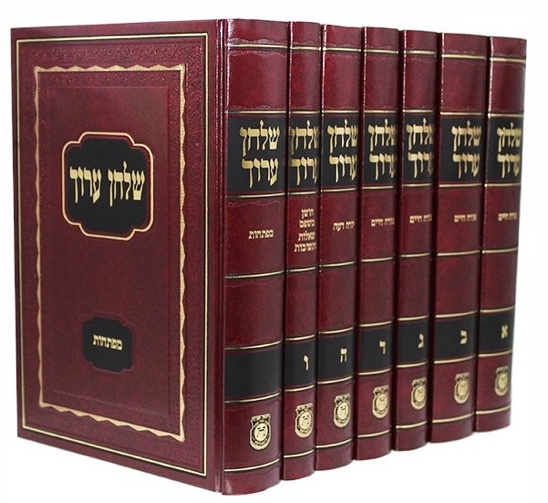Preparation from Shabbos to Yom Tov etc.
• Preparation from the first day Yom tov to the second day Yom tov or from Yom tov to Shabbos or from Shabbos to Yom tov is not allowed.
• This applies even if there’s no melacha being done (like washing dishes, settings tables etc).
• This applies even for doing mitzvos.
• If frozen food is needed for the second night Yom tov etc:
1) if you don’t defrost the food during the day you wont be able to have the food that night then it’s allowed to be
defrosted early enough in the day that it could theoretically be eaten that day.
2) put the frozen food for the night into a bag together with something that you’ll need during the day and then it can be taken out during the day.
• There’s no issur to prepare before making kiddush/havdala but the words “Baruch Hamavdil Bein Kodesh Likodesh” should preferably be said before doing the work.
• One should not say that they’re going to sleep in order to have energy for the night.
• A child can be told to go to sleep in order to have energy for the night because it’s a mitzva to listen to a parent.
Kiddush/Havdalah
• Havdala is made during kiddush.
• There is no besamim.
• There are various customs how to make the bracha on fire. The simplest is to just look at the fire of the Yom Tov candles without touching the flames together.
• Most have the custom not to hold the fingers up to the flame when making the bracha of “Borei Miorei Haesh”.
Staying awake all night
⁃ This is a minhag not Halacha.
⁃ One who will not be able to Daven properly or do other mitzvos properly should not stay awake all night.
⁃ Staying awake until dawn and then going to sleep is allowed, as long as no Zmanim are missed and as long as a shomer is appointed to remind you to Daven.
⁃ One who’s awake all night should wash the hands at dawn.
⁃ No bracha should be made on washing the hands unless you go to the bathroom.
⁃ If it’s going to cause bitul Torah then you can wait until before davening to wash the hands.
⁃ Birchas Hatorah shouldn’t be made. However if you slept at least a half hour during the day then birchas hatorah can be made in the morning.
⁃ All other birchos hahsachar can be said except for נשמה אלוקי and שינה המעביר מעיני.
⁃ One who goes to sleep for a few hours after staying up all night should not take off the tzitzis and should not make birchas hatorah again after waking up.
⁃ No bracha should be made on tziztis. One should hear the bracha from someone who puts on a talis gadol.
⁃ Bracha on talis shouldn’t be made before the proper time.
Dairy
⁃ There are various customs of eating dairy on Shavuos.
⁃ If one is going to make a dairy meal then it’s preferable to be a night meal and not a day meal.
⁃ If one is eating dairy followed by meat in the same meal:
⁃ 1. New challah/bread must be brought to the table
⁃ 2. Hands must be washed
⁃ 3. Some parve food must be eaten
⁃ Many have the custom to wait an hour between eating meat and dairy. Some wait half an hour.
⁃ If one just ate dairy before the meal but didn’t wash for bread, a bracha achrona must be said before proceeding to wash for the meal.
⁃ Cheese that’s aged for more than 6 months requires a 6 hour wait before eating meat.
⁃ Real parmesan cheese is aged 6 months.
⁃ If the cheese was melted then no waiting is required.
⁃ There are those that are lenient with our aged cheeses. If necessary, this opinion can be relied upon.
– Parve foods made in/with meat utensils can be eaten at dairy meals and vice versa but not in the same mouthful as dairy. This applies even if they were used for hot meat in the last twenty four hours.
– If the utensils weren’t used for hot meat in the last twenty-four hours then they can even be eaten in the same mouthful as dairy and vice versa.
Oven use for meat and dairy
The following Halachos apply for baking dairy in a clean meat oven or meat in a clean dairy oven (even if used in the last 24 hours):
• If it’s covered (even one cover) it’s allowed.
• If it’s uncovered and it’s solid food (e.g. challah, cake, cheesecake) it’s allowed.
• If it’s liquid, turn the oven on 550 for an hour and it will be kashered. (This cannot be done on Yom Tov).
• Parve, even liquid, can be baked, even uncovered, in a CLEAN meat or dairy oven and it will remain parve.
• In all of the above situations it’s better to put foil down on the grates before baking in case something spills.
• A meat hot plate/blech can be used to heat up dairy if the hot plate is covered with foil.
• The foil can be placed onto the hot plate/ blech on Yom Tov, as long as the foil was precut.
• On Yom Tov, crockpots, hot plates, coffee makers, etc. can be put on Shabbos clocks to go on and off.
• Once the above are turned on, the pins can be removed with a shinui in order for them to remain on or off.
Flowers
• Many have the custom to put out flowers etc.
• Flowers can be moved on Shabbos and Yom Tov, even when they’re in a vase.
• Flowers that fall out of the vase can be returned to the vase as long as they’ve fully blossomed.
• Water can be added to the vase but only up to half the amount of water that’s already there.
• Plants and flowers in pots can also be moved but not into the sun.
• Petals that fall off are muktza but can be disposed of if it’s bothering you.











This is last years Halachos